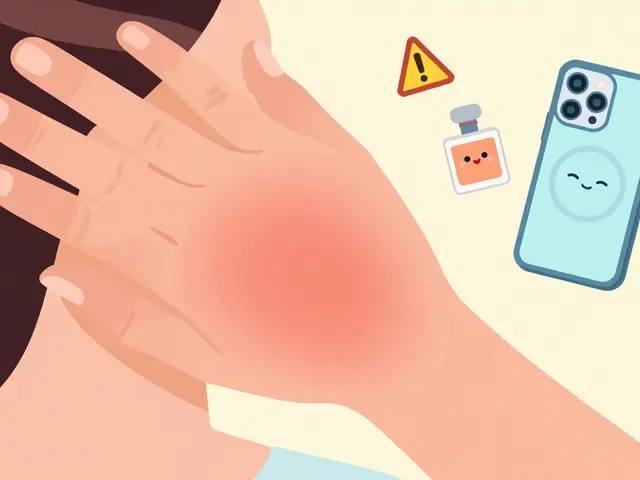
Looking for a Cetirizine alternative in 2025? You're in the right place. Allergies can be a real hassle, and choosing the right medication makes a difference in managing your symptoms. Whether you're dealing with nasal congestion, sneezing, or itchy eyes, there's an option out there to suit your needs.
One interesting alternative is Azelastine (Astepro). This isn't your standard pill but a nasal spray that targets symptoms directly. With allergies often playing out in your nose, addressing issues like congestion and runny nose directly can be a game-changer.
Azelastine (Astepro)
Azelastine is a topical nasal antihistamine spray designed to make breathing a little bit easier. If you're finding your nose to be a battleground in the allergy war, this might be a solid option to consider. Simply apply it directly into the nostrils twice daily, and it gets to work fast.
Pros
- Rapid local action
- Reduces nasal inflammation
- Suitable for persistent symptoms
Cons
- May cause nasal dryness/irritation
- Less effective for eye symptoms

Azelastine (Astepro)
When it comes to dealing with allergies, Azelastine, known commercially as Astepro, stands out as a viable Cetirizine alternative. If you've ever found your nasal passages blocked tighter than a jar lid, you might just appreciate this nasal spray's approach.
Azelastine (Astepro) works directly where the action is—right in your nose. It's a nasal antihistamine spray that's designed to provide relief from nasal congestion, runny noses, and sneezes. You simply apply it into the nostrils twice daily, and it gets to work directly on the site of your symptoms. No more waiting for a pill to make its way through your system.
How It Works
This spray operates by blocking histamines—yep, those pesky chemicals your body releases during an allergic reaction. By targeting them right when and where they strike, Azelastine quickly reduces those frustrating symptoms.
Pros
- One of the biggest perks is the rapid local action. Unlike oral meds that take time to circulate through your bloodstream, this one’s fast because it goes right to the source.
- It's particularly good at reducing nasal inflammation. If you often feel like you're carrying around two tennis balls in your nose, this could help shrink those down metaphorically.
- It's especially useful for those with persistent symptoms, giving a needed edge when things don't let up.
Cons
- However, like all things, it's not perfect. Some users report nasal dryness or irritation, a minor trade-off for clearing congestion.
- And if your eyes are the main issue, you might need something else in the mix, as it's less effective for eye-related symptoms.
Overall, Azelastine (Astepro) can be a great choice for those looking to focus on nasal symptoms. Just remember, a little nose dryness can be a part of the deal!

Conclusion
So, when it comes to finding the best alternative to Cetirizine, a few considerations can point you in the right direction. Each option has its unique features, and picking the right one might depend on your specific needs and symptoms. For anyone needing quick relief primarily for nasal issues, Azelastine could be a game-changer with its direct nasal application.
These alternatives offer new ways to tackle allergies, and modern times have brought us a variety of choices to explore. A note from the healthcare journal 'Allergy Insight' emphasizes,
"The diversity of antihistamines available today allows patients to tailor their treatment to specific symptoms, enhancing overall quality of life."
Here's a quick glance at comparing the alternatives, including their useful aspects:
| Alternative | Pros | Cons |
|---|---|---|
| Azelastine (Astepro) | Rapid action, Nasal inflammation reduction | Nasal irritation, Less effective for eyes |
Ultimately, managing allergies is about finding the right balance and what works best for you. Always consult with a healthcare provider to tailor your approach, making the most of these modern solutions.




KAYLEE MCDONALD
July 18, 2025 AT 14:53This article brings up some important points when thinking about allergy meds beyond Cetirizine. I've tried a couple of alternatives recently, and honestly, ease of use and how fast the relief kicks in make all the difference for me.
It’s also crucial to consider the side effects. Like, some alternatives cause drowsiness, which is a dealbreaker depending on your lifestyle. The way the post breaks down symptoms targeted by each medication is super helpful for making an informed choice.
Has anyone else experienced strong differences in effectiveness between these meds? I’m curious about how practical switching to these alternatives might be for those with severe allergies.
Alec McCoy
July 19, 2025 AT 06:40Really appreciated the thorough approach here. The variety of alternatives laid out doesn’t just help allergy sufferers find solutions but educates us on the nuances of symptom management!
Allergy meds are often treated as one-size-fits-all, but this post highlights why that couldn't be further from the truth. Effectiveness varies hugely depending on what symptoms one is battling.
Also, big ups for touching on the practical aspects like ease of use. It’s so easy to forget that some meds have to be taken at precise times or have interaction restrictions.
I’d love to see a comparison chart next time that includes user reviews or personal experiences with these alternatives.
Aaron Perez
July 22, 2025 AT 18:00Look, let’s not kid ourselves—pharmaceuticals are a game of risks and trade-offs. This article waltzes around the glowing benefits like they’re a cure for allergy misery, but don’t you wonder about the bigger picture? About the relentless cycles of dependency we forge with these medications?
Does anyone stop to question if these alternatives just shuffle symptoms around or dull our very awareness of our physiologic state?
It feels like every new antihistamine touted as superior is just another cog in the wheel of mass pharmaceutical persuasion. Something to chew on while you pick your poison, I guess.
Michelle Weaver
July 26, 2025 AT 05:20Thank you for this insightful post! 👏 It's refreshing to see alternatives to Cetirizine that are evaluated not only by effectiveness but also by symptom specificity and user experience.
Each individual's response to allergy medication can be so different, so understanding these alternatives helps patients make choices that are best suited to their needs. 🌿
Additionally, considering side effects like drowsiness or dry mouth is vital, especially for people needing to stay alert throughout the day. I would highly recommend consulting with a healthcare professional alongside this guide to find the optimal solution. 🌟
Evan Riley
July 29, 2025 AT 16:40I can’t help but wonder if these so-called alternatives are really what they seem? Sometimes I think the pharmaceutical industry pushes these meds and their substitutes while hiding certain data that could be critical for public knowledge.
It’s almost suspicious how some alternatives gain popularity suddenly; wonder if it’s orchestrated. Are we just the consumers in a well-oiled marketing scheme instead of truly benefiting from them?
Anyone else feeling skeptical here? I agree that ease of use and symptom targeting are important, but what about the long-term health consequences?
William Mack
August 2, 2025 AT 04:00The cultural angle here is fascinating. Different countries often prefer various antihistamines based on access, marketing, and even traditional practices. This article’s focus on 2025 options makes me curious if newer meds reflect emerging global trends or just Western-centric pharmaceutical progress.
Has anyone from outside the US tried these alternatives? Are these options broadly accessible or mostly localized to certain regions?
It’d be great to discuss how cultural preferences and health systems influence medication availability and choice for allergies.
Nicole Povelikin
August 5, 2025 AT 15:20Ugh... I tried some of those so called alternatives. Honestly, they don’t work half as well as Cetirizine imo.
And the side effects? Don’t get me started. One left me feeling weirdly off balance and tired, which is just ridiculous considering it’s supposed to ease allergy discomfort.
Plus, who even knows if these drugs haven’t got more stuff in em that we’re not told about? It’s like a gamble every time with these meds.
Why fix what’s not broken honestly? Cetirizine worked just fine for me.
KAYLEE MCDONALD
August 6, 2025 AT 19:06I get what you’re saying about side effects. They’re definitely a dealbreaker for some. But sometimes trying those alternatives can give insights we wouldn’t get sticking strictly to the familiar.
Definitely agree everyone’s experience varies though. It’s always smart to weigh benefits against possible drawbacks carefully.
Has anyone here found a non-drowsy option that actually worked better than Cetirizine? Curious to hear real-world stories.
nina greer
August 10, 2025 AT 06:26Honestly, the idea that Cetirizine has any pure superiority is a bit naive, wouldn’t you agree?
There are literally dozens of antihistamines with superior pharmacodynamics and fewer liabilities, but mainstream media conveniently promotes the familiar name, not necessarily the best product. 👀
This article scratches the surface, but I’d expect a deeper analysis for any real connoisseur of pharma advancements.
Jeremiah Morgan
August 13, 2025 AT 17:46While all opinions have their merit, I encourage everyone to maintain an open mind when considering allergy treatment options. The world of pharmacology is ever evolving and with scientific advancements, we may find better-suited alternatives with minimal side effects that improve quality of life.
Patience and a willingness to try under medical supervision can open up new pathways to managing allergies more effectively. I strongly recommend consulting health professionals and using resources wisely.
Montague Tilmen
August 17, 2025 AT 05:06Isn’t it suspicious how these new meds keep coming out? Almost like there’s a bigger agenda to keep us dependent. We need to be cautious and question what we’re told by big pharma’s mouthpieces.
Nobody talks about natural remedies or ways to boost immunity without relying solely on these synthetics.
People gotta wake up and do their own research beyond flashy articles and commercial pushes.